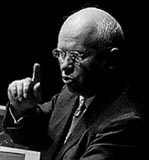|
More People |
|||||||||||||||||||
|
|
|||||||||||||||||||
|
|||||||||||||||||||
|
|
|||||||||||||||||||
|
He joined the Russian Revolution in 1918, fighting for the Bolsheviks during the Civil War. His first work for the Soviet Government took him to the Ukraine. Eventually he joined the Central Committee of the Soviet Communist Party in 1934, and became the first secretary of the Ukrainian party.
After improving agricultural methods in the Unkraine, he returned to Moscow. Although he was an important figure in the government, he was not closely tied to Stalin.
When Stalin died, Khrushchev took power. In 1956, he denounced Stalin and his policies. He became the first secretary of the Communist party and later the Soviet premier as well. Khrushchev wanted a "peaceful coexistence" between the US and the Soviet Union, and met with the American leadership on several occasions. He cancelled a summit meeting in Paris when an American plane was shot down while spying on the Soviet Union. Khrushchev and the other Soviets were very pleased to learn that Cuba's new government would be aligned with them. After American attempts to overthrow the Cuban Government, Khrushchev placed Soviet nuclear missiles in Cuba.
He agreed to remove the missiles in return for a promise from Kennedy not to invade Cuba. This was done with great loss of face for Khrushchev.Due to poor harvests, declining relations with the C
|
|||||||||||
 Nikita Khrushchev was born on April 17, 1894. He grew up in a mud hut and worked many hours in coal mines throughout his childhood.
Nikita Khrushchev was born on April 17, 1894. He grew up in a mud hut and worked many hours in coal mines throughout his childhood.